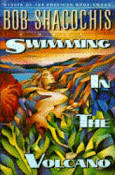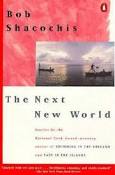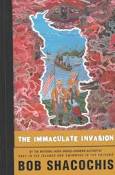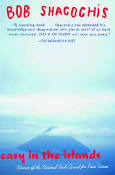Review of Bob Shacochis's (Eastern Caribbean 1975-76) The Woman Who Lost Her Soul
 The Woman Who Lost Her Soul
The Woman Who Lost Her Soul
by Bob Shacochis (Eastern Caribbean 1975–76)
Atlantic Monthly Press
$28.00
713 pages
2013
Reviewed by Tony D’Souza (Ivory Coast 2000-02, Madagascar 2002-03)
WITH THE WIDELY HERALDED release of his first novel since 1993’s National Book Award Finalist Swimming in the Volcano, Bob Shacochis has managed to make dead one of the livelier discussion points that’s unified Peace Corps writers for the better part of the past two decades: “What’s up with Bob, anyone seen him?” “One assumes he’s still in New Mexico, working on that crazy, alleged book.”
that’s unified Peace Corps writers for the better part of the past two decades: “What’s up with Bob, anyone seen him?” “One assumes he’s still in New Mexico, working on that crazy, alleged book.”
The crazy, alleged book long ago became mythological.
“I heard it’s about a zombie in Haiti.” “Haiti? I heard it was set in Croatia.”
It’s been widely assumed Shacochis had waded into a literary quagmire, drowned himself in a stubborn attempt at an overreaching Ur text, a quixotic journey to write the whole history of some esoteric hobby horse, a mission never to be fulfilled. And now the book is here, read, reeling in my head. I’ve finished its 700 pages in two long sittings. I can’t imagine the fortitude it took him to bring this off, the patience to weather the whispers and passage of time. Was it worth it? The novel has left my emotions in a tight range between blackest grief and sorrow.
We talk about Shacochis because we admire him; he’s among our greats on the writing front, yes, but also in bonhomie. He’s selfless with his literary currency, the cheerleader of our careers; when we’re lucky enough to see him, he’s irreverent and exuberant and bawdy, a stubbornly happy fellow.
Still, as the years rolled by we had to admit that even for the great ones-and probably especially for them-writing is ultimately very hard. Perhaps even defeating.
“How messy do you think it is?” “He supposedly told ____ it was well over 1000 pages.” “God!” “I saw an excerpt of it, you know, some years ago, in a little journal out in the sticks. It’s crazy!” “What year was that?” “About the time you were born, har har.”
Whatever we may or may not have assumed he was doing in his cabin in New Mexico all these years, we now know he was writing his best.
Set on a vast stage that travels in place and time between recent Haiti, WW II Yugoslavia, Istanbul, Afghanistan, terror camps in Africa, the Beltway, Langley, Special Forces bases around the world, a storm swept Carolina beach and a lovely ranch in the West, The Woman Who Lost Her Soul achieves the gripping grandeur that moved 30 million copies of The Girl With the Dragon Tattoo with none of the two-dimensional genre tricks the less talented Larsson couldn’t do without. Shacochis’s novel has the intrigue and sexual creepiness of Chinatown, the brutal cloak and dagger of Hitchcock’s Topaz, the beautiful, murderous chaos of Apocalypse Now and the unsalvageable regret of Bruce Dern swimming into the waves at the end of 1978’s Vietnam War heartbreaker, Coming Home.
This is an old-fashioned, character driven spy novel, a slow build, a slow burn, an investment by the reader that the novel’s confusing mélange of patois and locations in the early going will actually go somewhere. We start in Haiti where human rights lawyer Tom Harrington has exhumed plenty of mass graves; a deep cover former spook named Connie Dolan has engaged him on a mysterious mission to investigate the death of an American coke smuggler’s whore wife. When he sees the pictures of the dead girl Dolan knows as Renee, Harrington instantly understands he’s in over his head. He knows this girl, too, and intimately, but by a completely different name: Jackie.
Harrington is aging, dispirited by decades as witness to slaughter in the Third World, tyrants supported  in their bloodlust by the guns of the superpower he calls home. Jackie, a beautiful rookie photographer shooting portraits of Haitian houngan voodoo priests had rekindled in him something he’d thought he’d lost long ago: his heart. Something she whispered to him-that she was afraid she had lost her soul on the island-becomes the jumping off point for his search for her killers.
in their bloodlust by the guns of the superpower he calls home. Jackie, a beautiful rookie photographer shooting portraits of Haitian houngan voodoo priests had rekindled in him something he’d thought he’d lost long ago: his heart. Something she whispered to him-that she was afraid she had lost her soul on the island-becomes the jumping off point for his search for her killers.
“‘I want to know about the white woman who came to Bòkò St. Jean because she lost her soul,'” Harrington, now in enemy territory, threatens a houngan in a trance.
“‘What do you want to know about this woman?’ said Toussaint, acting out the voice of the lwa.
‘I want to know if she found it,’ said Tom. ‘Did she find her soul?'”
As he peels back the intrigue, Harrington quickly discovers that Jackie, Renee, whoever the fuck she was, was a player in a violent international game.
What I admire most about Peace Corps writers is not their agility with languages and foreign landscapes-which is great-but their precision with detail. Peter Hessler so thoroughly rendered China that on the Internet, one easily finds laments by younger Sinophile writers, “Peter Hessler already wrote about that.” Theroux’s African villages are true from sky to dust; Kluge makes tiny island nations feel as grand as their inhabitants think they are. Here, Shacochis renders CIA anti-terrorism acronym-speak as though it’s his mother tongue, the grinding on and off-duty lives of our killer Special Forces with the intimacy as though he was one of them.
As with so much about this book, the reader would be mistaken to believe Harrington is the protagonist-he’s not-or that Renee/Jackie (who we later come to know best as Dottie, though I can’t reveal why for spoilers) is any of the guises we begin to think she is. It’s safe to say, however, that Renee/Jackie/Dottie knows more than any of the rebels, heroin dealers, terrorists, good guys, bad guys, invisible guys and murderers that her childhood friend, Captain Eville Burnette, must contend with to help her keep her secrets. An introspective true believer in the loftiest ideals of egalitarian America, Burnette pulls the trigger more than almost anyone else in this book, and bears the guilty brunt of all that death. He’s the good cop-that part is sure-until it seems he isn’t, as with everything in The Woman Who Lost Her Soul.
If this review isn’t making simple things like plot or character very clear, I can only say that giving up  even small pieces of what Shacochis has built surely topples the Jenga. What’s safe to reveal, however, is that through the sprawling, interconnected narrative, the author has made a compelling case that our War on Terror has its roots in the Crusades, not in any cartoonish The Da Vinci Code kind of way, but in the simple, lasting human need for revenge. There has never been and will not be any peace between Islam and the West; Shacochis’s case is as simple as a freighter off the coast of Haiti tied to a dead white whore, tied to a Miami drug cartel, tied to displaced Syrian businessman, tied to terror cells in the Panjshir Valley. He makes clear how poverty in Haiti brought down the Twin Towers as certainly as Al-Qaeda.
even small pieces of what Shacochis has built surely topples the Jenga. What’s safe to reveal, however, is that through the sprawling, interconnected narrative, the author has made a compelling case that our War on Terror has its roots in the Crusades, not in any cartoonish The Da Vinci Code kind of way, but in the simple, lasting human need for revenge. There has never been and will not be any peace between Islam and the West; Shacochis’s case is as simple as a freighter off the coast of Haiti tied to a dead white whore, tied to a Miami drug cartel, tied to displaced Syrian businessman, tied to terror cells in the Panjshir Valley. He makes clear how poverty in Haiti brought down the Twin Towers as certainly as Al-Qaeda.
To think of the book simply as a spy novel reduces it far too much; the careful reveals and methodical pacing allow us to sink into the characters so deeply, it’s as though their lives are rendered from memoir. People you hope won’t die in this book do, and their loss is so profoundly felt that one is left wondering if the old, big art being practiced here will take these levels of emotion with it when it goes. Yes, younger authors still attempt this scale of novel (Franzen in Freedom), but not many, and none of their characters escape their own insipid pedestrianism. On the point of gravitas, Shacochis has no issues.
One wouldn’t be wrong to compare The Woman Who Lost Her Soul to Showtime’s Homeland, though the novel is never jingoistic or racist as the show is and it’s much more sweeping. And then of course, there is the language.
While he occasionally allows his literary exuberance to obscure simple meaning, such as in a central scene of violence where this: “…the broomstick of his Soviet-made prosthesis ripped through the clenched ring [of her anus]…” makes the reader unnecessarily wonder if a villain has a poorly made Eastern bloc dildo where his dick should be, the writing is generally lovely. Here, among my favorite passages, towards the end of the book, where the language becomes as frenetic as the plot:
“Then on his last wave he came smashing to shore, his back wrenched by the impact, and looked around for Dottie, who had pulled out of the same wave and held back. When he spotted her again he saw her mermaid’s form suspended in the wall of a gigantic swell, her body vertical, her hair like a crown of fire…suddenly ascending to her right she had company, a mako shark, its split tail fin only a few feet away from her hip in the screen of the wall, its shape silhouetted in the refracted light, its length easily twice her length, and there they were, embedded inside the wave like objects in amber….”
There’s plenty of that sort of imagistic clarity in a novel that needs all of its 700 pages to come clean. The ride is wild, wrenching, and whoever she was, Renee, Jackie, Dottie, The Woman Who Lost Her Soul is ultimately tender and meaningful. It’s a long arc to get there, but we do get there. If the major prizes don’t come this year, it’s not because there wasn’t a book to deserve them.
•
Bob Shacochis first collection of stories, Easy in the Islands, won the National Book Award for First  Fiction. His second collection, The Next New World, was awarded the Prix de Rome from the American Academy of Arts and Letters. His novel, Swimming in the Volcano, was a finalist for the National Book Award, and The Immaculate Invasion, his first person, nonfiction account of US intervention in Haiti, was a finalist for The New Yorker Literary Award for Best Nonfiction Book of the Year. He’s a contributing editor for Outside.
Fiction. His second collection, The Next New World, was awarded the Prix de Rome from the American Academy of Arts and Letters. His novel, Swimming in the Volcano, was a finalist for the National Book Award, and The Immaculate Invasion, his first person, nonfiction account of US intervention in Haiti, was a finalist for The New Yorker Literary Award for Best Nonfiction Book of the Year. He’s a contributing editor for Outside.
Reviewer Tony D’Souza (Ivory Coast 2000-2002, Madagascar 2002-2003) is a finalist for the bi-annual St. Francis College Literary Prize for mid-career novelists, announced later this month at the Brooklyn Book Fair.
No comments yet.
Add your comment